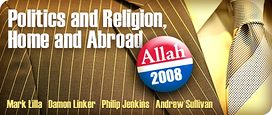Some scattered responses to my interlocutors:
On the Trinity: having tried to compress the argument of The Stillborn God to a couple thousand words, I see now how even good readers like Philip could be misled. The argument I make there is that the strange theological dynamics of the trinitarian idea made it difficult for Christians to agree on the proper attitude to adopt toward the world in general. God the father was like the transcendent deity of the Hebrew; the Christian Messiah then arrived, only to leave again; but the Holy Spirit remains. From Hegel to Hans Blumenberg, observers have seen this ambiguous picture of the divine’s relation to the world as the source of Christianity’s long struggle with both gnostic withdrawal and apocalyptic messianism. In the book, I also try to suggest it is at the root of Chritianity’s difficulty in establishing a consensus view about church-state relations. But readers will have to examine the book to see if they are persuaded by that.
On “comprehensive law”: here I really don’t understand Philip, for surely he agrees that there is nothing remotely approaching shari’a or halacha in Christianity. The New Testament does not provide detailed rules governing all aspects of human life, nor does canon law or even Aquinas’s Summa. In fact, it is for just this reason, as Philip rightly says, that Muslims and Jews were much more open to arguments from reason and natural law: both faiths developed complex systems of jurisprudence that were the loci of those discussions, long before Christianity did.
On theocons: I was very interested by Damon’s response to Philip regarding theological pluralism, which they are trying to overcome. That’s an important point, one I hadn’t thought about before. As for whether the theocons deny that human beings legitimately rule themselves, I defer to Damon’s intimate knowledge of them and their works. I am puzzled, though, how they could think that the Constitution was “on their side” and that “He [God] rules.” How does the theology work here? Has God subcontracted to us, and the Constitution is the paper we signed implicitly with him? More detail on this would interest me, if Damon can provide it.
On Habermas: A reader has asked what I think about “Jurgen Habermas’ recent and striking comment that democracy is dependent on Christian culture and theology.” I still haven’t been able to make sense of Habermas’s recent writings in this area, and how (or whether) they can be reconciled with his earlier writing. The argument I make in The Stillborn God is that Western democracy is indeed dependent on its Christian past, but most decisively in trying to offer an alternative to Christian political theology. Our greatest dependence is always on our adversaries.

